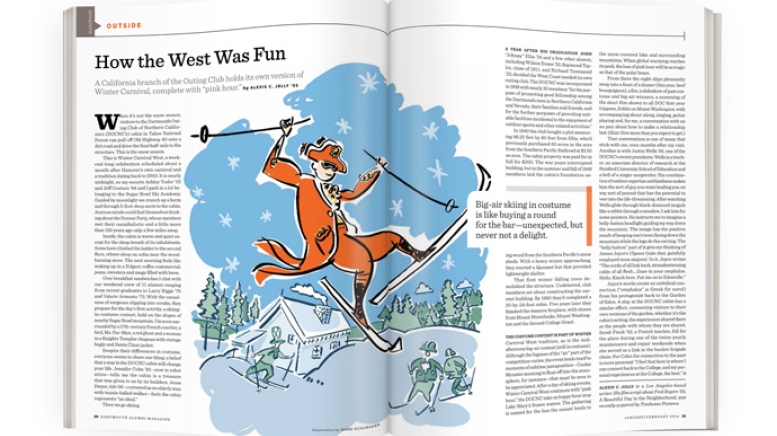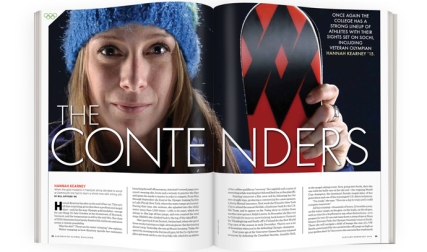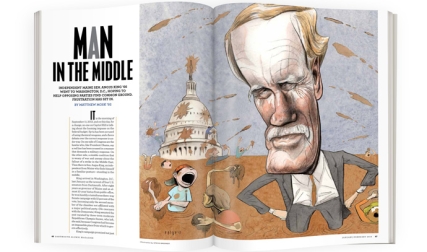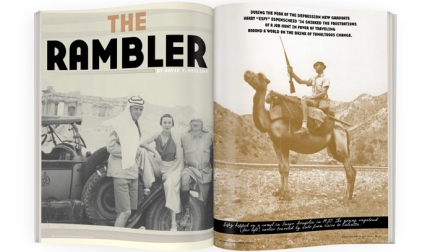When it’s not the snow season, visitors to the Dartmouth Outing Club of Northern California’s (DOCNC’s) cabin in Tahoe National Forest can pull off Old Highway 40 onto a dirt road and drive the final half-mile to the structure. This is the snow season.
This is Winter Carnival West, a weekend-long celebration scheduled about a month after Hanover’s own carnival and a tradition dating back to 2003. It is nearly midnight, so my escorts Ashley Tudor ’02 and Jeff Couture ’94 and I park in a lot belonging to the Sugar Bowl Ski Academy. Guided by moonlight we crunch up a berm and through 3-foot-deep snow to the cabin. Anxious minds could find themselves thinking about the Donner Party, whose members met their cannibalistic end a little more than 150 years ago only a few miles away.
Inside, the cabin is warm and quiet except for the sleep breath of its inhabitants. Some have climbed the ladder to the second floor, others sleep on sofas near the wood-burning stove. The next morning feels like waking up in a Folgers coffee commercial: jeans, sweaters and mugs filled with brew.
Over breakfast sandwiches I chat with our weekend crew of 11 alumni ranging from recent graduates to Larry Riggs ’70 and Valerie Armento ’73. With the casualness of surgeons slipping into scrubs, they prepare for the day’s first activity: a skiing-in-costume contest, held on the slopes of nearby Sugar Bowl mountain. I’m soon surrounded by a 17th-century French courtier, a bird, Ms. Pac-Man, a red ghost and a woman in a Knights Templar chapeau with vintage bugle and Santa Claus jacket.
Despite their differences in costume, everyone seems to share one thing: a belief that a stay in the DOCNC cabin will change your life. Jennifer Cohn ’93—now in robot attire—tells me the cabin is a treasure that was given to us by its builders. Jesse Dwyer, Adv’06—costumed as an elderly man with tennis-balled walker—feels the cabin represents “an ideal.”
Then we go skiing.
A year after his graduation John “Johnny” Ellis ’34 and a few other alumni, including Wilson Evans ’33, Raymond Taylor, class of 1911, and Richard Townsend ’23, decided the West Coast needed its own outing club. The DOCNC was incorporated in 1939 with nearly 30 members “for the purpose of promoting good fellowship among the Dartmouth men in Northern California and Nevada, their families and friends, and for the further purposes of providing suitable facilities incidental to the enjoyment of outdoor sports and other related activities.”
In 1940 the club bought a plot measuring 88.25 feet by 60 feet from Ellis, who’d previously purchased 60 acres in the area from the Southern Pacific Railroad at $3.50 an acre. The cabin property was paid for in full for $200. The war years interrupted building, but in the summer and fall of 1946 members laid the cabin’s foundation using wood from the Southern Pacific’s snow sheds. With a heavy winter approaching, they erected a Quonset hut that provided lightweight shelter.
That first winter falling trees de-molished the structure. Undeterred, club members set about constructing the current building. By 1950 they’d completed a 20-by-24-foot cabin. Five years later they finished the massive fireplace, with stones from Mount Moosilauke, Mount Washington and the Second College Grant.
The costume contest is part of Winter Carnival West tradition, as is the mid-
afternoon big-air contest (still in costume). Although the bigness of the “air” part of the competition varies, the event lends itself to moments of sublime juxtaposition—Cookie Monster seeming to float off into the atmosphere, for instance—that must be seen to be appreciated. After a day of skiing events, Winter Carnival West continues with “pink hour,” the DOCNC take on happy hour atop Lake Mary’s frozen waters. The gathering is named for the hue the sunset lends to the snow-covered lake and surrounding mountains. When global warming reaches its peak, the loss of pink hour will be as tragic as that of the polar bears.
From there the night slips pleasantly away into a feast of a dinner (this year, beef bourguignon), a fire, a slideshow of past costume and big-air winners, a screening of the short film shown to all DOC first-year trippees, Schlitz on Mount Washington, with accompanying shout-along, singing, guitar playing and, for me, a conversation with an au pair about how to make a relationship last. (Hint: Give more than you expect to get.)
That conversation is one of many that stick with me, even months after my visit. Another is with Justin Wells ’95, one of the DOCNC’s recent presidents. Wells is a teacher, an associate director of research at the Stanford University School of Education and a hell of a singer-songwriter. His combination of outdoor expertise and kindness makes him the sort of guy you want leading you on any sort of pursuit that has the potential to veer into the life-threatening. After watching Wells glide through black-diamond moguls like a rabbit through a meadow, I ask him for some pointers. He instructs me to imagine a belly-button headlight guiding my way down the mountain. The image has the positive result of keeping one’s torso facing down the mountain while the legs do the carving. The “belly button” part of it gets me thinking of James Joyce’s Ulysses (take that, gainfully employed econ majors). In it, Joyce writes “The cords of all link back, strandentwining cable of all flesh.…Gaze in your omphalos. Hello. Kinch here. Put me on to Edenville.”
Joyce’s words create an umbilical connection (“omphalos” is Greek for navel) from his protagonist back to the Garden of Eden. A stay at the DOCNC cabin has a similar effect, connecting visitors to their own versions of the garden, whether it’s the cabin’s setting, the experiences shared there or the people with whom they are shared. Sarah Finck ’02, a French teacher, fell for the place during one of the twice-yearly maintenance and repair weekends when she served as a link in the bucket-brigade chain. For Cohn the connection to the past is more personal: “I feel that here is where I can connect back to the College, and my personal experiences at the College, the best.”
Alexis C. Jolly is a Los Angeles-based writer. His film script about Fred Rogers ’50, A Beautiful Day in the Neighborhood, was recently acquired by Treehouse Pictures.




